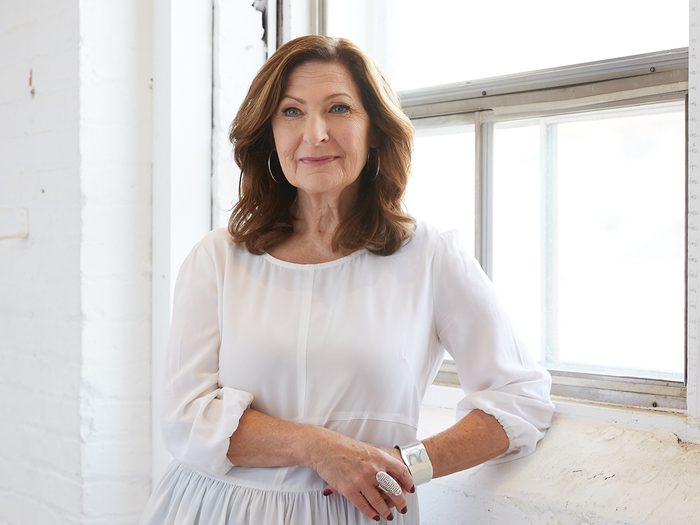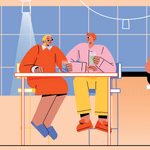Anna Maria Tremonti: “I Knew I Shouldn’t Carry This Shame. And Yet I Did.”

In her new podcast, Welcome to Paradise, veteran Canadian journalist Anna Maria Tremonti shares the personal story that she kept quiet for 40 years.
Warning: This story contains mentions of domestic violence.
Anna Maria Tremonti’s voice is immediately recognizable. As a veteran CBC journalist and 17-year host of CBC Radio One’s The Current, Tremonti brought Canadians crucial stories from across the country as well as from international conflict zones with her signature mix of hard-hitting questions and empathy. She built her award-winning journalism career by sharing the stories of others, particularly the victims of gender-based violence. Now, for the first time, Tremonti is sharing her own story, and an experience she kept quiet for 40 years.
“When I’m in broadcast mode, this voice of mine has hidden my greatest secret,” Tremonti says in the first episode of her new CBC podcast Welcome to Paradise. The six-part series, available on CBC Listen and all other podcast platforms, details Tremonti’s experience with intimate partner violence—an issue that affects more than 107,000 Canadians every year.
“Welcome to Paradise looks at the long tail of intimate partner violence through the prism of my own experience, in a marriage that I managed to get out of 40 years ago. So, I’m not only telling my story of what happened to me, I’m looking at how things have followed me over time,” says Tremonti. What followed her, she explains, includes “the shame, the self-blame, the physical reactions to things,” like her persistent impulse to hide bruises.
During the pandemic, the World Health Organization dubbed violence against women a “shadow pandemic” with rates of domestic violence in Canada rising dramatically. Support for victims of domestic abuse have never been more needed. With these statistics in mind, we spoke with Tremonti about her personal experience with intimate partner violence, and her message for victims and their loved ones.
Note: If you are reading this and need support, don’t wait. Please visit Ending Violence Association of Canada to find support services and resources available across Canada.
How are you doing today?
I’m fine. To get to this point to release a podcast, I had a lot of angst and second guessing before in the writing of this thing. I have dealt with all of that. So, I’m fine. I’m glad that it’s getting out.
Tell me a bit about that angst, where does that come from? What were you afraid of?
I think that comes from the shame that I’ve carried. What I’ve now been able to really identify is the deep-seated shame. I knew that intellectually, it was there, but I do think that was part of it, that fear of being judged. Fear of going public with something that I have not been public about, and just letting anybody weigh in. I’m not so afraid of that anymore—but that’s been a process.
I find that when I write about my own experiences, I learn about myself through how the story comes together. What did you learn about yourself in telling this story?
The main thing was the effect of the therapy. I originally wanted to work with [psychotherapist] Farzana Doctor so that she could be a touchstone for me as I told this story, just to keep me feeling emotionally stable through what I knew I would have to talk about. I thought she might be a little part of this podcast, but she ended up becoming a real thread. And through working with her, I ended up identifying the shame.
I’ve done other therapy, and it has helped, but I’ve never identified the shame, to the degree and the depth that I did in my sessions with her. By the time I got to writing the final part of the podcast, I realized that that shame had fallen away. I wasn’t expecting to rid myself of that because I had not quite registered how embedded it was.
That’s the main thing. The other thing was that my family and friends knew that I was in an abusive marriage. And after I got out, I told them. But I never got into the real detail of individual incidents of assault. I did for the sake of this podcast and there is one particular assault that I remember really well, but there was one aspect of it that I did not. It was the last time he beat me up, days before my first job interview with the CBC in Fredericton. And I remember having to figure out if the blouse I was wearing would cover the bruises around my neck. I went to the interview and managed to get the job. But I couldn’t remember how I got those bruises. And I realized going over it and writing about it that I must have blacked out. I had never thought about that before.
That must be such a scary realization, finding pieces of your story you didn’t know you were missing.
It’s funny, intellectually, I understood that I wanted to write about this. Viscerally, I had a real hard time writing that scene. But you know, in the case of my experience with intimate partner violence, there has always been that emotional and visceral disconnect. I know I was not to blame. I know I shouldn’t carry the shame. And yet I did. I knew at the time that what was happening to me was wrong. But I absorbed what he would say to me, that I drove him to it. So even though it didn’t make any sense—especially as a 23-year-old, who was confused and emotionally distraught about what was happening to me—I accepted those things and carried them with me.
Looking back, do you have a better understanding of why you accepted those things at the time?
I do because I have read about this stuff. Jane Monckton Smith’s book “In Control” lays out the eight steps of coercive control, which if not intervened with, can end up in homicide. And when I read it, I thought, Oh my God, I’m textbook. Farzana reminded me that everyone is, which is why they write these things.
Coercive control is akin to a hostage taking—this is how experts who work in the field describe it. So it often starts with a whirlwind and by the time that control kicks in, you have a victim who will sometimes willingly change their behavior because if they don’t, they know what’s coming. In her book, [Monckton Smith] writes at the end, that her own daughter ends up in a case of coercive control and you can’t just barge in and change it because the victim has to buy into the idea that they are being coercively controlled.
(Related: What Is Gaslighting—and How to Tell if You’re Experiencing It)
I imagine when people hear the first few episodes, their response is: Why didn’t you leave? But as you say, it is much more complicated than that.
Yes, it is. People also ask: Did you see red flags? I don’t think red flags exist. They exist for people observing from the outside who can see it maybe a little more dispassionately.
I really relate to the urge to barge in when you see a loved one in danger. But when you were going through it, was there anything anyone could have said to break that cycle?
Not when I was in the thick of it, no. When it comes to someone who’s a victim of [domestic violence], the level of shame and unworthiness is already there, right? So, the idea that you are worthy of having a different kind of life is really a hard one. I have not tried to get someone else out of a situation like that and I think it would be very hard. We have real professionals who work with that. They’re very careful to help people see that there are options they don’t realize they have.
You mentioned how working Farzana Doctor really helped you. Do you have any advice for finding professionals to help in these situations?
We have a really sophisticated system for trying to help people now, which didn’t exist in the early 80s. So, we have resources out there where people can ask professionals how to move forward. I will also say, look for somebody who does talk therapy. In my job, I’ve always been a big believer in the power of conversation and the therapy that I was doing is about a conversation. It’s not solely about finding the right person—and I do accept that it’s hard—but it’s also about being at a point where you’re willing to open up.
(Related: 3 Survivors Share Their Stories of Escaping and Healing From Domestic Violence)
Now that you’re sharing this story, I imagine you’re getting a ton of responses. Have any been particularly meaningful for you?
I have been contacted by people I do not know, people I know pretty well and people I know in passing who have confided in me since realizing that I was going public with this. I was really taken by how many people mentioned their shame. It’s something that we carry, and it’s something that we shouldn’t be carrying. It would be such a wonderful thing for anyone to be able to release themselves from shame that was never theirs to have.
Do you have a message for people who are watching a loved one go through this right now and feel unsure of what to do?
I don’t think you can demand that they get out. You have to be there to help them when they feel it is safe for them to get out. Be available to listen without judgment. And then maybe go through resources and find out from people who work in this field what else you can do to be ready to help. It seems so simple, but listening is hard. And the more you listen, the more people will tell you and the more they will tell you about their fears and what they hope for themselves.
What do you hope listeners take away from Welcome to Paradise?
I really do want people to understand that they are worthy, because that’s the hardest thing, you know? That somehow you think you deserve that kind of treatment. And you don’t.
This interview has been edited and condensed for clarity.
Next: 12 Things Most People Don’t Realize About Domestic Violence




